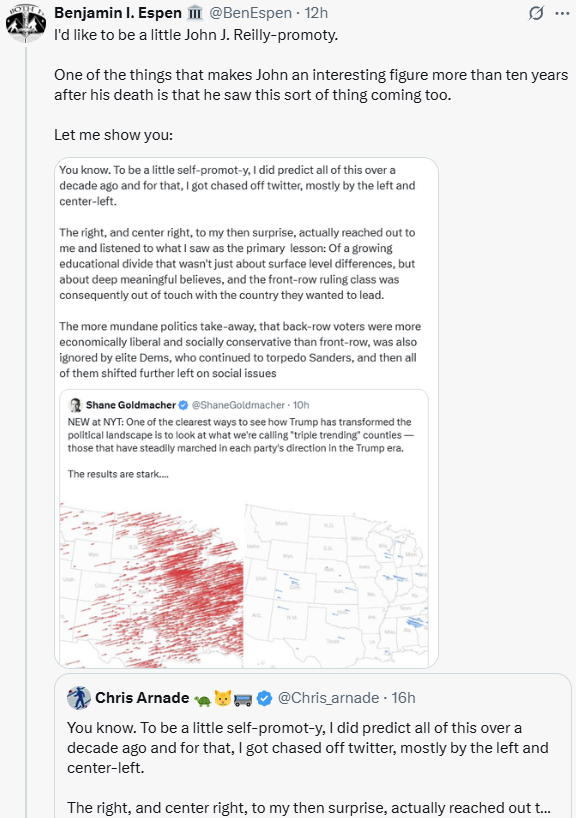The Long View 2007-10-12: Doris Lessing, the Zombie Continent, Orthodox Revival

The birth rate in Poland did tick up a bit, but in overall terms it was pretty small compared to the decrease over the twentieth century.
Doris Lessing, the Zombie Continent, Orthodox Revival
The more interesting Nobel Prize award of recent days is not the one to the Goracle (only The Onion will be able to do it justice, but the one to Doris Lessing
Announcing the award in Stockholm, the Swedish Academy described her as “that epicist of the female experience, who with skepticism, fire and visionary power has subjected a divided civilization to scrutiny.”
Hurrah for the old girl, I say: she is 87 years of age, and may she have many more in which to gloat over the dwindling rabble of hostile critics who have not predeceased her. Nonetheless, I cannot help but suggest that perhaps the Nobel committee did not understand the full body of work they were commending.
Lessing is, of course, best known for The Golden Notebook (1962), which the critical establishment has decided to remember as a proto-feminist statement, though my own recollection is that the book is chiefly about an English Leftist moving on from Stalinism. "Moving on to what?" is the interesting point: I read the book because of a rave assessment by the old New Ager, William Irwin Thompson, to the effect that the book is an important step in the respiritualization of the literary imagination. (This is one Big Book I never reviewed, though I refer to it very briefly here.) Some of her later novels, usually classified as science fiction, show that Thompson was not altogether off the mark.
Ah, but what kind of spirituality? The New York Times report quoted above briefly refers to Lessing's interest in Sufism. I was aware of that 30 years ago, but my later study of esoteric Tradition taught me to regard such an interest among Westerners with a measure of alarm. (Though some Sufis I find congenial.) Indeed, only in recent years have I understood what Lessing's novel, Shikasta (1979) was really about. A surface reading reveals, of course, that it is anti-Christian, anti-Western, and anti-American, and that it ends with a ragged apocalypse not unusual for the period in which it was written. Now I know that this historical scenario simply repeats the model of secular degeneration shared by the esoteric fascists.
It is also, I think, the only major novel I have read that depends for part of its effect on the use of different typefaces (different offices in Hell favor different forms of Arial, apparently). Producing the book must have been a chore in 1979.
* * *
Speaking of The Onion, readers will be pleased to learn that Proposed (Classified) Bill Will Defend Against Flesh-Eating (Classified). Yes, we are getting on to Halloween.
* * *
As for the Zombie Continent, Mark Steyn has some comments on Old Europe and its crepuscular demography which I am sure his many fans will enjoy. Here, however, I note just this item:
This is why I'm opposed to universal social programs - because they were set up on the basis of mid-20th century birth rates.
This is not so of Social Security, for instance, which in the US began during the Depression era Birth Dearth. At that time, fertility was at or below replacement level, and was not expected to improve dramatically. Social Security turned out to be based on a false image of the future, but at least that image was generated from assumptions that were not obviously ridiculous. We must contrast that procedure with the logic behind the promotion of 401Ks and other personal pension vehicles: proponents of these devices assumed that high-rate asset growth will last forever. In fact, of course, that growth has been based in part on the great demographic bulge of working-age Babyboomers, an ephemeral situation that is even now ending. There are good arguments to be made about the mix of private and public funding of pension benefits. On the whole, however, the public-funding option has been attended by less wishful-thinking.
* * *
But look: the zombie stirs, if we may believe this report from Poland:
Demographers confirm it. In 2006, for the first time in ten years, Poland had a positive natural growth...10 per cent more than the year before...
[For what reasons?] One is the people born during the baby boom of the early 1980s. [The current uptick is an echo of an earlier increase.]...
It is now much easier to buy an apartment thanks to the accessibility of bank loans...
A rise in planned pregnancies among university students has also been observed in large cities.
If you want to increase the fertility rate, forget about giving people college-fund bonds or other baby bonuses. Rather, make housing cheap and let students graduate from college without debt.
* * *
As for baptizing the zombie, Russianologist Nicolai N. Petro of the University of Rhode Island suggest An Orthodox balm for Europe. The piece is apparently commentary on remarks that Russian Orthodox Patriarch Alexei II made on a recent visit to France:
Kazan, Russia - For decades, many social scientists had pretty much two things to say about Eastern Orthodox Christianity: 1) that like all religions, it was disappearing with the advance of modern civilization; 2) that it derived most of its support from the reactionary tides of authoritarianism and nationalism.
Those pronouncements are being proved wrong. Today, as in the parable of the prodigal son, throughout Eastern Europe people are returning to the Orthodox Church in droves, and the effect in the public sphere, contrary to most expectations, is quite benign....
Western suspicion of Eastern Orthodoxy can be traced back to before the Great Schism that divided the Christian Church in 1054. One hundred and fifty years later, it fueled the Crusaders' zeal for the sacking of Constantinople. In the 18th century, it became a main theme of Edward Gibbon's influential interpretation of the Roman Empire, which was later echoed in the writings of Oswald Spengler and Arnold Toynbee. And in modern times, Samuel Huntington, among others, has warned direly of the potential for clashes between "Slavic-Orthodox" civilization and the Catholic-Protestant West...Orthodox believers already far outnumber Protestants across Europe, and by some estimates they may eventually even surpass Roman Catholics. If 21st-century Europe ever develops a religious complexion, it will be predominantly Eastern Orthodox.
Actually, one might note that the chief connection between the Great Schism and the Crusades is that the First Crusade was launched as part of a papal policy (successful, for a while) to mend relations between the Latin West and Byzantium.
As for the Orthodox revival, I wish it luck, but it seems to me to be excessively dependent on government patronage.
Copyright © 2007 by John J. Reilly
Support the Long View re-posting project by downloading Brave browser, and then trying it out. With Both Hands is a verified Brave publisher, you can leave me a tip too!



Comments ()